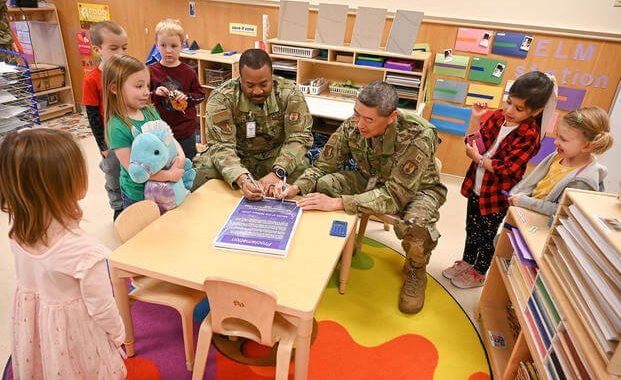Army veteran was plagued by panic attacks. Then he hiked 11,000 miles.
8 min read
Will “Akuna” Robinson hikes in Purgatory Creek Natural Area in preparation for his upcoming thru-hike of the Appalachian Trail.
Will Robinson was about 100 miles into his hike on the Pacific Crest Trail when the dark clouds started to lift. Not the ones high in the California sky, but the ones clustered in his head.
“I learned that I was capable of living, I was capable of leading. I was capable of inspiring and motivating people. That was something I had completely lost for a decade-plus,” said the 41-year-old Army veteran who struggled with depression, anxiety and post-traumatic stress disorder after his medical discharge in 2003. “I started peeling back the layers, mile after mile after mile.”
Since that first long-distance hike in 2016, his mileage has multiplied to more than 11,000 miles and counting. In 2019, he became the first Black American man to earn the Triple Crown of thru-hiking by completing the trifecta of legacy trails: the 2,650-mile PCT from California to Washington state, the 2,194-mile Appalachian Trail from Georgia to Maine and the 3,100-mile Continental Divide Trail from New Mexico to Montana. Two years later, ESPN declared Robinson “the trailblazing superstar of thru-hiking.” He also received the 2022 George Mallory Award, which honors exceptional outdoor explorers.
The superlatives still apply. During the height of the pandemic, he bagged several more epic hikes, including the Tahoe Rim Trail (165 miles) in California and Nevada, the Arizona Trail (more than 800 miles) and the Ozark Highlands Trail (270 miles) in Arkansas. He was about 100 miles into the Buckeye Trail when a sprain forced him to abandon the 1,400-mile route in Ohio. This year, he is training for the AT again – not because he enjoyed it so much the first time, but because he didn’t.
“I was expecting the AT to be like the PCT, but you can’t compare the two. That is part of the reason I am going back to hike it,” he said from his home in San Marcos, Tex. “Did I really give it a chance?”
Inspired by ‘Wild’
Before the PCT, Robinson had never seriously hiked, though the military had prepared him for similarly tough challenges. “The closest thing I did to hiking was drill marching,” said Robinson, who grew up on bases with his Army father. “It’s a lot different with a 100-pound pack and an M16, but it gave me a basis for hiking.” In the armed forces, he powered through his pain, a practice he had to unlearn as a trekker. “In the Army, you suck it up and drive on,” he said. “If you hurt your foot, you keep moving. In a thru-hike you learn how to listen to your body.”
After six months in Iraq and a stop in Germany for medical treatment, he returned to Louisiana, where he often felt too broken to leave the house, much less pursue outdoor activities. He underwent multiple surgeries and tried various therapy treatments and medications to no avail. “After Iraq, I was disabled at 23,” he said. A chance “encounter” with celebrity long-haul hiker and “Wild” author Cheryl Strayed provided the jolt he needed to recharge his life.
On that fateful day in March 2016, Robinson was in his room “like always” when he glanced at the TV and saw “Wild” on the small screen. In the film version of Strayed’s best-selling memoir, he watched Reese Witherspoon lug her pack by a PCT trail marker, a scene that stirred up a memory from Iraq. During his downtime, Robinson would often pore over a PCT guidebook, which someone had sent to the soldiers in a care package. “One day I’d love to do this,” he said, reminiscing about that period in his life when he envisioned a future filled with adventure.
Without waiting for the closing credits, he jumped onto his computer and acquired a free long-distance permit, one of 5,657 issued that year. On April 2, he arrived in Southern California and embarked on a journey of personal discovery and recovery that resembled Strayed’s transformative quest two decades earlier.
“When I picked up ‘Pacific Crest Trail: Volume 1’ at the REI store outside of Minneapolis, I had a very similar moment to what I imagine Will had. He saw Reese as me on the trail in the movie and I read a paragraph on the back of the book describing this long-distance trail,” Strayed said by phone last week. “I felt something inside of me that said, ‘You can do this and you should do this,’ because I intrinsically knew this would be healing.”
Beyond the physical benefits
In addition to the physical benefits of hiking in nature, medical experts extol its psychological virtues. Stanford University-led research from 2015 determined that walking at least 90 minutes in a non-urbanized setting can help alleviate depression, lower stress and anxiety, and reduce rumination, the infinite loop of negative thoughts. A 2019 study called “Nature and mental health: An ecosystem service perspective” also explored the wide-ranging rewards, such as a happier state of mind, more positive social interactions, a clearer sense of purpose and a sturdier grip on life’s demands.
“Before I left, I imagined that I would get to a place of mental well-being by reflecting on my life and being contemplative. But the surprise of my journey was how healing the physical act of walking was,” Strayed said. “There is something very comforting and consoling about taking that one step and then another step and then another step after that.”
The arrival of ‘Akuna’
Robinson did not initially set out to complete the entire PCT, which runs from the Mexican border to the Canadian border. His primary goal, he said, “was to try to see if I could find me again, regardless of how many miles it would take.” With only a few weeks to prepare, he trained around Slidell, about 30 miles northeast of New Orleans, and ordered gear based on suggestions from hiking blogs.
“People who backpack tell you those are the best things for backpacking, but they might not necessarily be the best for long-distance hiking,” he explained.
His tent, for instance, weighed about nine pounds, three times more than the models typically carried by thru-hikers. He also wore traditional hiking boots instead of lighter trail runners.
Early in the hike, he found his trail family and earned his trail name, “Akuna,” a riff on a Swahili phrase (and “The Lion King” refrain) that translates to “no worries.” The nicknames are bestowed by other long-distance hikers or are given to oneself. They are often fanciful, silly or philosophical.
About five miles in, he was resting on a rock, feeling sluggish, when a woman named “Cookie” appeared at his side. She determined that he needed food and proceeded to stuff her namesake snack into his mouth. The pair forged a bond along with “2Pie,” a teacher from Ohio, and “Nothing Yet,” a veteran who had tackled the AT the previous year to quell his PTSD. The group hiked together for long stretches, a major breakthrough for Robinson, who for years had avoided social situations because of his fraught mental state.
“Being around people triggered panic and anxiety attacks, and I didn’t want any part of it. I just shut down,” he said. “But on the trail, I ran into so many great individuals who were there for me. All they wanted was to be part of my adventure and help me accomplish my goal.”
At around the 700-mile mark, Robinson revised his objectives: “It finally hit me that maybe I could do this whole thing.” Unfortunately, he had to bail at Mount Whitney, the highest peak in the Lower 48, because of a dislocated knee. But the physical setback didn’t diminish his mental health achievements.
“Nature can be healing. It can be an alternative method when the standard treatments aren’t working for someone’s suffering,” he said. “For me, every hike is like a therapy session in progress. I’m going through things in my head, working out problems. When I find a solution, I can zone out and be in peace.”
Robinson, it turned out, had a lot in common with AT’s first documented thru-hiker. According to the Appalachian Trail Conservancy, Earl Shaffer, a World War II vet, hiked the entire route in 1948 to help with his war-related anxiety.
Love and friendship on the trails
In April 2017, Robinson returned to the PCT. For his second attempt, he packed lighter and smarter, but without sacrificing his small comforts and luxuries. He carried an automatic pump for his sleeping pad and a photo of his mother holding him in her arms. “It was my motivation on those rough days,” he said of the image from his infancy. He also brought a stash of Black and Mild cigars and gummy bears. “They were my reward for finishing the day,” he said.
After consecutive stints on the PCT, he found his next long-distance trail tougher to love. The AT’s terrain was more technical and hilly – a lot of “PUDS,” or pointless ups and downs, he said. A biblical amount of rain fell. “In all honesty, by Day 2 or 3, I absolutely hated the Appalachian Trail,” he said. “What kept me on that trail were the people. I enjoyed their company; the trail itself, I didn’t.”
Two of the more memorable hikers he met were “Emergency Tuna” and “Undecided.” “Emergency Tuna” lacked confidence and was usually the last person to arrive at camp. His group encouraged her, but she was impaired by self-doubt. He didn’t see her for about a thousand miles, but she resurfaced on Mount Katahdin in Maine. She was descending as he was ascending the last leg of the trail. “She beat us to the end,” he said with awe and respect. “Seeing her growth was a total highlight of the A.T. She went from a timid hiker who didn’t have a lot of confidence to blasting by us.”
As for “Undecided,” Robinson buddied up with Dawn Potts, her off-trail name, for the first 100 miles of the trek. Several hundred miles later, they were dating. In 2019, they completed the Continental Divide Trail as a couple. “We triple crowned together,” Robinson said of the honor the American Long-Distance Hiking Association-West has bestowed to only 575 hikers since 1994.
“Akuna is a wonderful and inspirational member of our hiking community,” said Lisa “Hummingbird” Slutsken, an officer-at-large at ALDHA-West.
After earning the coveted award, they celebrated by taking a Caribbean cruise. “Let’s go have a vacation where we don’t have to walk a thousand miles to get to where we want to go,” he said.





